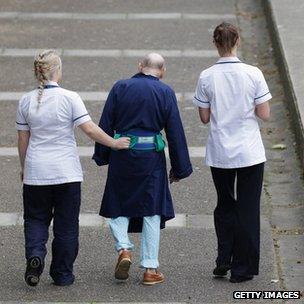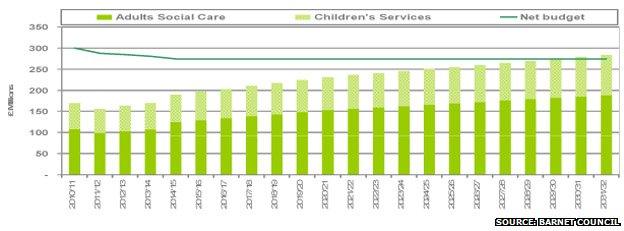Could care of the elderly haunt the Conservatives?
- Published
- comments

It was promised last autumn. Then it was the spring. Publication slipped until June and now we are told there will be nothing on government proposals to reform the funding of adult social care in England until at least July.
I have been given an exclusive insight into why the Treasury is dithering on Dilnot.
The coalition agreement says, external the government "understands the urgency" of reform, but it's almost a year since the Dilnot Commission sent ministers its recommendations , externalon how to provide an affordable and sustainable system, and it is hard not to conclude that promised urgency has given way to indecision.
It may be overstating it slightly, but some commentators believe that "flunking" reform of adult social care may be to the Tories what the issue of tuition fees has been to the Liberal Democrats.
Forty-four per cent of pensioner votes went to the Conservatives at the last election with the Tory manifesto promising, external "to protect" older people from having to sell their home to fund residential care costs.
So what is going on?
Whispers from Whitehall tell a story of agonising inside the Treasury - not only the question "Can we afford it?", but also asking "Is Dilnot's solution the right one?"
The commission's plan is for a cap on how much individuals must fork out before the state starts paying the bills. Recommending it be set at £35,000, the cost to the Treasury is put at around £1.7bn a year.

But with a second round of deep public sector cuts in the offing, the question being asked is whether the government can really agree to spend close to another couple of billion on subsidising residential care costs for people who may be relatively affluent in terms of property. What extra cuts would you make to find the money?
It would hardly play to the slogan "all in this together" if vast sums were taken from services to the most vulnerable and transferred into the legacies of well-off baby boomers.
Treasury officials have been looking at whether the money could be found from cuts to other services currently provided to the same group. Should winter fuel allowance and free TV licences be means tested? What about the state pension? For the moment, it seems the politics and economics of such moves cannot be made to add up.
There's another problem with the Dilnot plan, as far as the Treasury is concerned - it doesn't quite answer the conundrum of how to fund social care for those people who don't have the savings or capital to pay for it. At the moment this is paid for out of local authority budgets.
Allow me to introduce you to the "Barnet graph of doom".

This was a slide presented as part of a budget consultation in the borough last autumn which showed that, unless things change dramatically, within 20 years Barnet Council will be "unable to provide any services except adult social care and children's services: no libraries, no parks, no leisure centres - not even bin collections".
Andy Burnham: The Dilnot proposals are an important first step towards a fairer system
The "Barnet graph of doom" has been doing the rounds in Whitehall, adding to the sense that Andrew Dilnot's proposals do not provide a solution to the care funding crisis. Mr Dilnot would argue that he has already factored in the demographics of an ageing population, but Treasury officials remain unconvinced.
My understanding is that the social care bill announced in the Queen's Speech is likely to offer warm words but little or nothing on cold cash - "a white paper with green tinges" as one senior official described it to me.
The political implications may be significant at the next election. Will the grey vote forgive the Conservatives if the social care funding issue is effectively hoofed into the long grass for the remainder of this Parliament?